2014 Prize Winners
We had twelve outstanding winners of the 2014 Lush Prize, drawn from ten countries across five continents.
Congratulations to them, and all the other short-listed nominees.
Lobbying Prize
Policy interventions promoting the use of alternatives
Winner 1: Center for Alternatives to Animal Testing, Germany
http://cms.uni-konstanz.de/leist/caat-europe/
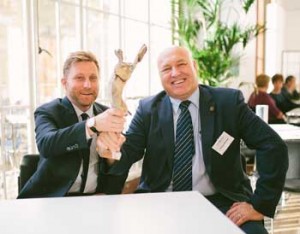
The Center for Alternatives to Animal Testing (CAAT-Europe), housed at the University of Konstanz (Germany), brings together industry representatives, regulators, and academics to address the needs for human-relevant alternative methods to animal testing.
CAAT promotes the development and implementation of alternative methods in safety testing by information sharing and by coordinating conferences and workshops. The result has been more than 30 publications with over 200 co-authors in peer-reviewed journals. CAAT-Europe was established in 2010 as European branch of CAAT located at the Johns Hopkins University in Baltimore, Maryland (USA). Collaboration between the two arms of CAAT is the basis for building a transatlantic bridge between scientists and regulators in Europe and the US.
With 33 years of history in the US, CAAT’s 25-person staff and advanced research laboratories collaborate with the US regulatory bodies (e.g. FDA, US EPA) and other governmental agencies. With policy programs in Washington since 2006 and Brussels since 2012, CAAT makes its expertise available to policy-makers.
CAAT-Europe’s vision is to be a leading force in the development and use of reduction, refinement, and replacement alternatives (3Rs) in research, testing, and education. The goal is to better protect both human health and the wellbeing of animals.
“We run two centres on both sides of the Atlantic, on alternatives to animal testing and developing the science and this is why this award is really helpful.”
Winner 2: New Zealand Anti-Vivisection Society
www.nzavs.org.nz
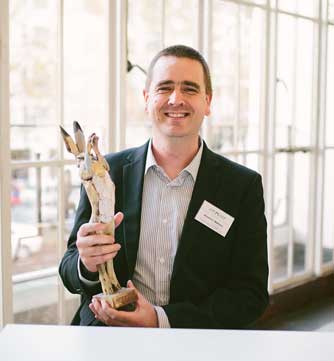
The New Zealand Anti-Vivisection Society (NZAVS) is a campaign group that opposes all animal testing. It achieves this through research, education, public awareness and political lobbying.
As well as the major campaign and success with legal high testing, which brought to light the proposed animal testing of legal highs and campaigning until all animal testing was banned in law – it has undertaken other national public awareness campaigns.
NZAVS has held information stalls at events around New Zealand; had informative magazine and newspaper ads; organised series of nationwide postering campaigns; uncovered animal testing by a company that claimed to not do any; provided information, advice and research on animal testing issues for Members of Parliament and many of New Zealand’s other animal campaign groups as well as for countless members of the public.
In 2013 it published a new website to keep members and supporters updated and to act as a resource for information on animal testing in New Zealand; this is an on-going project. The main focus of its work over the last 18 months and more has been on stopping the proposed animal testing of legal highs, something that is now included in the legislation.
The Prize was accepted by Stephen Manson.
“Being awarded the Lush Prize has allowed us to expand and plan new campaigns to end animal testing that we wouldn’t have been able to do otherwise.”
Public Awareness Prize
Policy interventions promoting the use of alternatives
Winner 1: Taiwan Society for the Prevention of Cruelty to Animals (TSPCA)
www.spca.org.tw

The issue of cosmetics animal testing is not well known by the Taiwanese public.
Taiwan Society for the Prevention of Cruelty to Animals (TSPCA), Be Cruelty-Free Taiwan, was launched in March 2014 and strives to enhance public awareness of the issue while pushing for a legislative ban.
To announce the launch of the campaign, TSPCA sent a ‘bunny street team’ to the streets of Taipei to hand out fliers and free carrots, spreading the message about the cruelties of cosmetics animal testing and why a legislative ban is crucial. An educational section on its website was created, including a shopping guide.
In June TSPCA held a press conference in June to announce that it would be working with Legislator Wang Yu Min to draft a new bill to end cosmetics animal testing in Taiwan. Wang sits on the government committee that is responsible for reading bills related to the cosmetics industry. Other attendees included: two city councillors, supermodel Patina Lin, bloggers, and was sponsored by Lush Cosmetics and Spa Ritual.
TSPCA aims to promote kindness towards, prevent cruelty to, and alleviate the suffering of animals in Taiwan by all legal means. It will achieve this through, educating, campaigning and lobbying, investigating cruelty and rehoming.
The Prize was accepted by Beki Hunt and Connie Chang.
“The Lush Prize gives a very generous amount of money to groups and individuals who are doing great work in trying to end animal testing. Both the recognition and the donation that comes along with being a prize winner makes it one of the most coveted awards. I hope more people will get involved and join in on the fight to end animal testing and to celebrate the efforts happening around the world.”
Winner 2: Humane Research Australia
www.humaneresearch.org.au

Humane Research Australia is a not for profit organisation that challenges the use of animals in research and promotes more humane and scientifically-valid non-animal methods of research.
Its recent campaign included the publication of a children’s (true) storybook called ‘Leo escapes from the lab’. Leo is an ex-laboratory cat who now serves as an ambassador to the millions of animals used in research every year. He has become somewhat of a ‘celebricat’ with his own Facebook page and an adoring fan base that grows day by day.
The wonderful illustrations that have been designed for this book truly capture the essence of Leo, his little sidekick Alfie, his big brother Rocky and the human characters he has met along his journey. It is hoped that Leo’s story will provide children with an understanding of how wrong animal experimentation is, and serve to influence future generations of researchers, donors and philanthropists.
Also, its partnership with HSI’s Be Cruelty Free Campaign gained support from the Greens with the introduction of a private members bill to ban the testing of cosmetics on animals and public consultation by Labor. HSI believe Australia is edging closer to implementing a ban this cruel and unnecessary practice.
The Prize was accepted by Helen Marston.
“Not only did the Lush Prize provide us with recognition for the work our group has done, it has assisted us to be a stronger force in our future campaigning. It has been a huge boost for us financially, and has given us the confidence that there is corporate support for an important ethical issue despite the vested interests that we are faced with on a daily basis.”
Science Prize
21st century Toxicology
Winner: Professor Roland Grafström and Dr. Pekka Kohonen
Karolinska Institutet, Sweden
http://ki.se/en/imm/startpage

The Karolinska Institute (KI) is the largest centre for medical education and research in Sweden and the home of the Nobel Prize in Physiology or Medicine. KI consists of 22 departments and 600 research groups dedicated to improving human health through research and higher education.
The Grafström laboratory is located at the Institute for Environmental Medicine (in Swedish: “Institutet för Miljömedicin”; IMM) and is one of the largest research departments at KI. The project has developed a cancer biology work and Tox21 Century Toxicology-inspired approach for replacing toxicity testing in animals with informatics-driven data analysis of human cell cultures exposed to toxic agents.
Combining in vitro and in silico analyses has been the focus of the Grafström laboratory for decades. This work was recently expanded together with Dr Pekka Kohonen within the pan-European SEURAT-1 project (‘Safety Evaluation Ultimately Replacing Animal Testing’), aiming ultimately to replace repeated dose toxicity testing with data-rich analyses of sophisticated cell culture models.
The role of the Kohonen/Grafström team has been to guide the application, analysis, interpretation and storage of so called “omics” technology-derived data within the service-oriented subproject “ToxBank”.
“We are very proud and thankful to win the Lush Prize. Our lab is working on the concept of Tox-21, combining cell culture work as an alternative to animals with big data analysis. “
Training Prize
Training researchers in non-animal methods
Winner 1: Africa Network for Animal Welfare, Kenya
www.anaw.org
The Africa Network for Animal Welfare (ANAW) was established in 2006 as a Pan African Non-Governmental Organisation.
 It is registered under the provisions of the Non-Governmental Organisations Co-ordination Act, of the Laws of Kenya and its mission is to work together with Communities, Governments and other animal welfare stakeholders in promoting humane treatment of all Animals across Africa.
It is registered under the provisions of the Non-Governmental Organisations Co-ordination Act, of the Laws of Kenya and its mission is to work together with Communities, Governments and other animal welfare stakeholders in promoting humane treatment of all Animals across Africa.
In September 2009 ANAW held a conference aimed at introducing and educating stakeholders on alternatives to animals testing. Participants represented various learning institutions, government representatives and professional associations.
The conclusions were that data on the number of animals used for testing was deficient due to lack of a standard reporting procedure; local use of alternatives was limited due to lack of information; educators who play a pivotal role in the development and execution of the curriculum further training on alternatives would favour their adoption in schools.
ANAW has since carried out several baseline studies to provide data which informs the campaign. Since 2010 to date, ANAW has been engaging students and members of staff in various institutions of higher learning, e.g. University of Nairobi, Baraton University and Kenyatta University. The approach has been mainly discussions, debates, workshops and seminar-like demonstrations on alternatives. The ultimate goal of this project is the replacement or the substitution of animals used in teaching/training with non-animal models.
The Prize was accepted by Dr Dennis Makau.
Winner 2: Professor Ovanes Mekenyan
Laboratory of Mathematical Chemistry, Bulgaria
www.oasis-lmc.org/

The Laboratory of Mathematical Chemistry (LMC) was established 30 years ago, in Burgas, Bulgaria, within the University ‘Prof. Dr. Asen Zlatarov’.
Nowadays, the Laboratory is one of the most influential molecular modelling labs worldwide.
LMC coordinates the efforts of almost 40 chemists, biochemists, physicists, mathematicians, statisticians and software engineers in predicting toxicological and biological properties of chemical compounds as well as simulation of metabolism.
International cooperation, interdisciplinary expertise and diversity of scientific products (mathematical models, software) are standards which place LMC in the globalised world science of predictive computational chemistry.
LMC is currently involved in a number of integrated EU projects and in silico chemical risk assessment services provided to chemical and cosmetic industries such as 3M, BASF, P&G, Dow Chemicals, L’Oréal, Givaudan, ExxonMobil, Unilever, DuPont etc., as well as the State regulatory agencies of Germany, France, Denmark, USA, Canada, Japan, Australia etc. Research activities in LMC are based on academic science, but their essential feature is bringing scientific products to the market and investing part of the gain into innovative research.
The Prize was accepted by Professor Ovanes Mekenyan.
Young Researcher Prize
Post-doctoral students specialising in alternative research
Winner 1: Róber Bachinski. Fluminense Federal University, Brazil

Róber Bachinski is a biologist, master in public health and environment and PhD student of the Postgraduate Program on Science and Biotechnology in the Fluminense Federal University (PPBI/UFF), Brazil. He started researching alternatives to education and training proposals as an undergraduate.
Since animal testing had been part of the undergraduate curriculum, he was the first student to get a legal recourse of conscious objection in Brazil. He participates in the 1R Net (www.1rnet.org), providing information to students and professors about alternatives to animal testing in education, animal ethics and conscious objection, through conferences in Brazil and other Latin-American countries and consultations.
In his PhD, Róber is developing research on 3D cell culture models, models for neuro-toxicology and neuro-pharmacology and alternatives for uses in the scientific education. These activities are developed in the Clinical Research Unit (UPC/HUAP/UFF), and in the Center for Alternatives to Animal Testing (CAAT/JHSPH/JHU). Róber also collaborates with the National Network on Alternatives (RENAMA), and with the organisation of the Latin-Iberoamerican Network on Alternatives.
“Lush Prize is proof that we can work for a better science. It encourages young researchers in the replacement of animal experimentation.”
Winner 2: Thit Aarøe Mørck. University of Copenhagen, Denmark
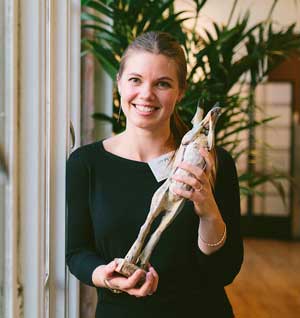
Thit Aarøe Mørck is part of the research group of Professor, PhD Lisbeth E. Knudsen at the Department of Public Health, faculty of Health and Medical Science at the University of Copenhagen in Denmark.
The main focus of the research is human exposure to environmental chemicals, with special emphasis on the sensitive periods of pregnancy and childhood. This subject is investigated through human biomonitoring where it collects samples (urine, blood, cord blood, hair) and analyses the collected matrix for biomarkers of exposure and effects.
The research team has so far measured a total of 62 chemicals and their metabolites as well as two biomarkers of effects in hair, urine and blood samples from Danish school children and their mothers involved in the EU project DEMOCOPHES.
Data on individual groups of chemicals have been analysed and published but the money from the Lush Prize Young Researcher award will enable data analysis of the micronuclei frequency and dioxin-like activity in relation to all measured exposure biomarkers and possible exposure sources and risk behaviours in a large aggregated statistical analysis.
Winner 3: Dr Henrik Johansson. Lund University, Lund, Sweden
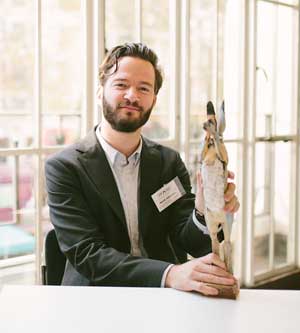
The project for which Dr. Johansson was awarded the Lush Prize Young Researcher Award describes the development and use of the novel test method GARD – Genomic Allergen Rapid Detection, an assay for assessment of chemical sensitizers. GARD utilises an in vitro model of so-called dendritic cells, a central player in the human immune system. These cells are stimulated with any substances to be tested, and following an incubation time of 24h, the genetic material of the cells are isolated. By measurements of a certain set of genes in the cells, which could be viewed as on/off-switches of the immune response, the eventual risk of the tested substances ability to induce allergy can be predicted.
Following the development of GARD, a spin-off company – SenzaGen AB – was formed. The mission statement of SenzaGen AB is to deliver to industry accurate and animal-free tools for prediction of sensitizing potencies and properties of chemicals and proteins, bringing academic results to good use for society.
Winner 4: Anne Krug. University of Konstanz, Germany
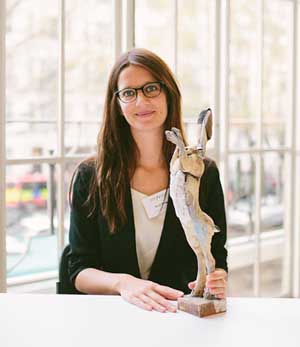
Anne Krug’s project measures human neurons, which are treated with different kinds of substances, to assess whether these have a negative impact on neurite growth. If so, the substances are followed-up in so called omics experiments, where the whole set of active genes or biochemical reactions can be analysed.
Her project therefore combines a high-throughput screening assay with advanced research technologies. It provides a cheap, effective and animal-free toxicity testing to identify putative developmental neurotoxicants, and to understand the underlying toxic mechanisms.
The Doerenkamp-Zbinden Chair of in-vitro Toxicology and Biomedicine was established at the University of Konstanz in 2006 as the first full professorship in Europe dedicated only to replacement alternatives to animal experimentation. Its research focusses on the development of alternative test systems to assess neurotoxicity and developmental toxicity without the need of animals.
Winner 5: Jonathan Nicolas. Division of Toxicology/RIKILT Institute of Food Safety, Wageningen University and Research Centre, Netherlands

Wageningen University and Research centre (Wageningen UR) is a collaboration between Wageningen University and diverse institutes. Among these institutes RIKILT (institute of food safety) has the responsibility to ensure that food is safe and authentic. Besides being the Dutch National Reference Laboratory for monitoring residues and contaminants in food and feed, RIKILT is a European Reference Laboratory for specific analytical domains.
In addition to method development and validation of tests, RIKILT also advises and participates in panels from the European Food Safety Authority (EFSA) and CODEX. The Division of Toxicology is part of the Agrotechnology and Food Sciences Group (AFSG) at Wageningen University. Areas of research vary from food toxicology to environmental toxicology.
This covers several disciplinary aspects of toxicology including development of alternatives to animal experiments (in vitro assays, modelling), assessment of risk associated with food constituents, investigation of the mechanisms via which toxic compounds can induce adverse health effects (in human and other organisms).




Spread the word: